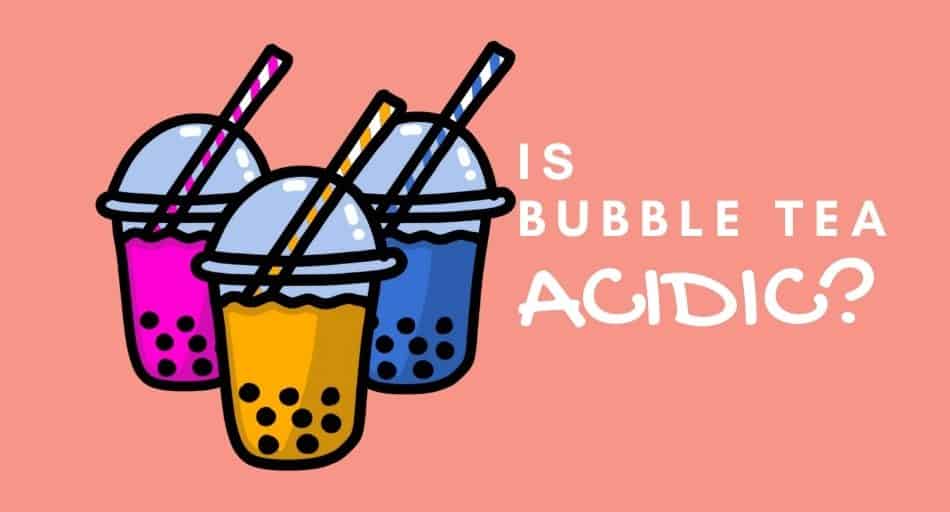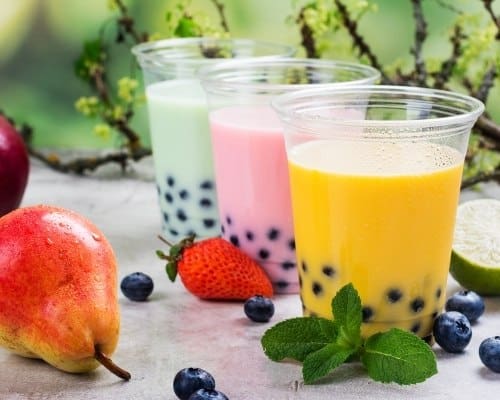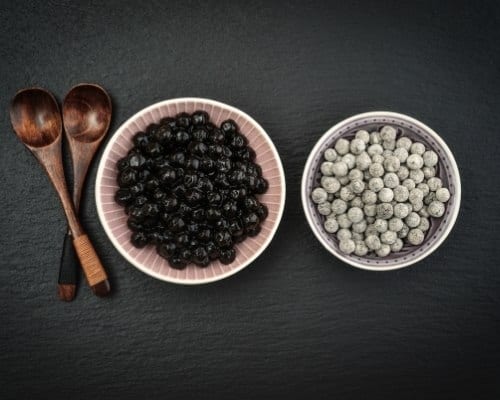In recent years, bubble tea has become all the rage as more and more people indulge in this drink. It originated in Taiwan but is now popular around the world. It’s made of tea and contains chewy tapioca balls, but there are other varieties available as well.

But, as you may imagine, this drink might not be as healthy as you think. For example, what if you suffer from acid reflux? Is bubble tea (boba) acidic?
Table of Contents
Is Bubble Tea Acidic?
Bubble tea or boba tea is an acidic drink made with concentrated tea and added sweeteners and flavorings, contributing to its acidity. The high concentration of caffeine – which is already bad for acid reflux – coupled with sugar makes bubble tea bad for your digestive system. Because of that, it might be best to avoid this drink altogether if you suffer from severe acid reflux or GERD symptoms.
What is the pH level of bubble tea?
Bubble tea is acidic and has a pH level lower than regular tea as it contains lots of sugar. It’s hard to determine the exact pH level of bubble tea as it strongly depends on the additives, flavorings, and whether milk or tapioca is added.
For example, drinking your bubble tea with milk has even more acid-forming properties than versions without it. As a result, this kind of bubble tea is even worse for your acid reflux and should be avoided as much as possible.
Is bubble tea good for you?

Boba tea is primarily made of carbohydrates, including sugar, which is hard for your stomach to digest. Because of that, your stomach produces more gastric acid, which can then reflux up your esophagus, causing painful symptoms, such as heartburn.
What’s more, sugar is not only bad for acid reflux but can also cause weight gain and an increased risk of developing type 2 diabetes. As a result, it’s important to limit how much sugary foods and drinks you’re consuming.
Bubble tea is also low in essential nutrients, so it mostly supplies you with empty calories. Because of that, you won’t consume enough vitamins and minerals, leading to weight gain, high blood sugar levels, and other health problems.
Consuming too many sugary drinks too often is also linked to an increased risk of cancer, so bubble tea isn’t a very healthy drink choice.
Certain studies also show that tapioca, which is a common ingredient in bubble tea, is hard to digest. Some people may also develop an allergy to tapioca, making it even harder on their digestive system. This is particularly problematic for people with celiac disease as their stomachs are already under a lot of stress.
Because of that, it’s best to avoid bubble tea if you’re experiencing digestive issues of any kind.
On their own, the ingredients in bubble tea aren’t bad as it’s primarily tea concentrate. But most commercially-sold bubble tea kinds are loaded with sweeteners and additives that may cause weight gain and cardiovascular issues.
Because of that, consuming artificially flavored drinks like bubble tea isn’t a good idea, especially if you’re prone to cardiovascular health issues.

Another thing to consider is that tapioca pearls that are often found in bubble tea are made from starch, but not the healthy kind. This lack of nutritious fiber means that drinking a lot of bubble tea can cause stomach inflammation and irritation that will only worsen your acid reflux and GERD symptoms.
It’s important to consume foods high in fiber, especially if you’re suffering from acid reflux, as it helps soak up excess stomach acid and feed the ‘good’ gut bacteria. So, it might be best to stick to natural teas made with fresh or dried leaves.
Is bubble tea bad for acid reflux?
Bubble tea is acidic and high in sugar, so it’s bad for acid reflux and GERD. It may worsen your symptoms and even make them more frequent. Bubble tea mainly contains carbohydrates, which are hard to digest, so your stomach has to produce more gastric acid to compensate for that.
Because of this and bubble tea’s lack of nutrients, it’s best to consume this drink as a treat and only if your digestive system can tolerate it.
Since bubble tea is high in calories, it can cause weight gain, which has been linked to more severe and frequent acid reflux and GERD symptoms. This means that if you drink bubble tea in large quantities, you may worsen your symptoms in the long run.
What’s more, weight gain isn’t only bad for acid reflux but also for your overall well-being, so it’s important to control how many calories you’re consuming.
Another thing about bubble tea is that some people don’t tolerate the tapioca pearls found in it. They are hard to digest and made of carbohydrates, which contributes to excess stomach acid production.
These tapioca pearls may also cause indigestion and constipation, which can further harm your digestive system and worsen your acid reflux and GERD symptoms.
Is regular tea bad for acid reflux?
Regular tea has a pH level of around 7.20. Black tea has a lower pH level than green tea, but fruit teas are the most acidic, so they should be avoided by people struggling with acid reflux or GERD symptoms.
Tea is also high in theine, which is a compound similar to caffeine but found in tea. It can irritate your stomach, just like coffee, and lead to excess stomach acid production, which can then reflux up your esophagus and cause unpleasant symptoms. Because of that, it might be best to stick to herbal teas or add milk to dilute your tea.
Bubble tea (boba) is an acidic drink that doesn’t contain a lot of essential nutrients. Because of that, it might worsen your acid reflux symptoms and make you feel much worse. It’s best to drink bubble tea as an occasional treat and indulge in green or black tea instead, which contains powerful antioxidants that help you stay healthy.
But, if you’re an avid fan of bubble tea, you can still drink it but just make sure to do so in moderation.
Don't know what to drink? Check out these articles: 20 Most and Least Acidic Juices and 20+ Alcoholic Drinks Ranked by Acidity Level
